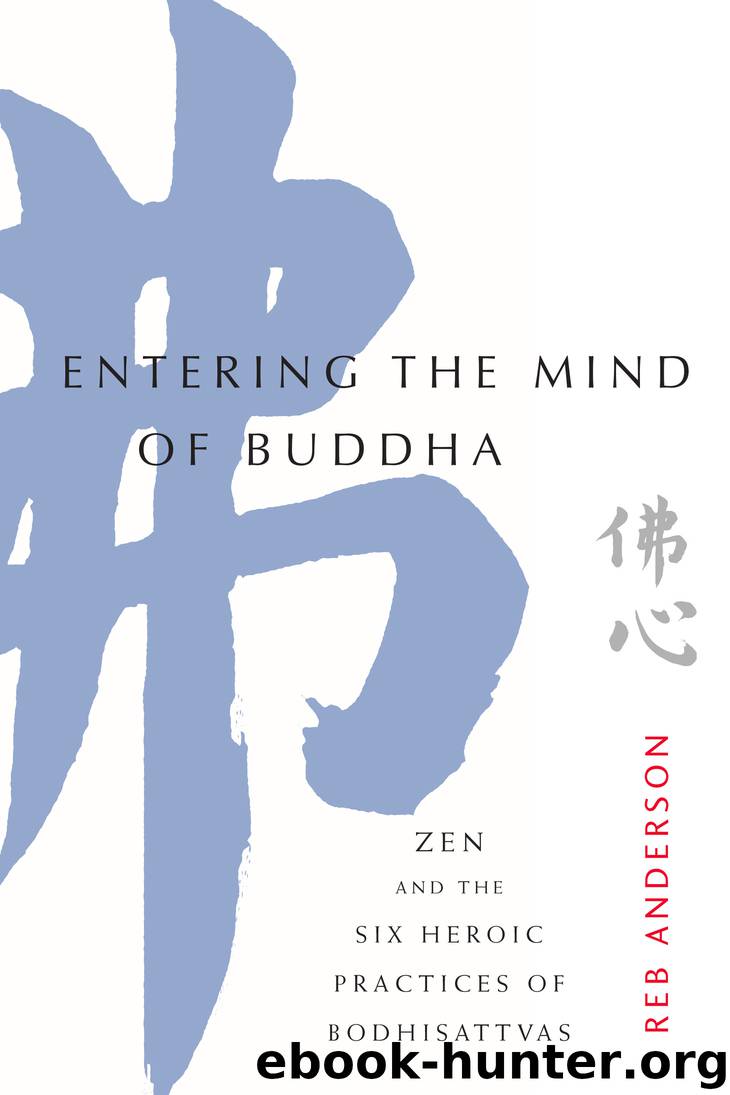Entering the Mind of Buddha by Tenshin Reb Anderson

Author:Tenshin Reb Anderson
Language: eng
Format: epub
Publisher: Shambhala
Published: 2019-12-16T16:00:00+00:00
THE FOURTH HEROIC PRACTICE
THE PERFECTION OF ENTHUSIASM
Joyful Effort
If you say that you do not need to fan yourself because the nature of wind is permanent and you can have wind without fanning, you will understand neither permanence nor the nature of wind.
—“Genjokoan,” Shobogenzo, by Dogen1
IN JAPAN, TO BE A ZEN PERSON has been described as being a vigorously jumping fish. The Japanese word for this is kappatsupatsu, which is onomatopoetic for the sound of a fish joyfully jumping and splashing in water. This term is often translated as lively, active, and vigorous. The fourth bodhisattva paramita—the perfection of joyful effort—is for the sake of generating, refreshing, and maintaining vigor in our practice. This heroic effort is especially necessary when we plunge into the practices of concentration and wisdom.
Generosity, ethics, and patience are wholesome and beneficial expressions of compassion. Some enthusiasm and effort are useful from the beginning of the path, and we have employed our energy to develop these first three practices. Through patience, we have plugged up some of the places where our energy drains away. Now we are ready to move forward into the practices of liberation. We are ready to generate the keen and enthusiastic energy necessary to realize the practices of concentration and wisdom.
Beginning Zen students are often graced with enthusiasm for practicing sitting meditation and listening to the teachings. After some time, however, many of them tell me that their practice has become stale and that their energy has gotten stagnant. They feel like they are forcing themselves to practice and just going through the motions. At such times, I ask them if they are engaging in this fourth practice of enthusiasm, and they often say they are not. It’s almost as if this bodhisattva practice were a secret. They don’t understand the necessity to create and renew their zeal for practice. In preparing for the work of concentration and wisdom, which free all beings from affliction so that they may dwell in peace, we need to renew and enrich our enthusiasm.
The bodhisattva vow is the most grandiose of all human ideals. In the stories of classical heroes and heroines like Psyche, Parsifal, and Don Quixote, they are often depicted as foolish. One of the reasons bodhisattva effort is called “heroic” is because we foolishly enter into this work wholeheartedly even though we don’t fully understand what we are getting ourselves into. Despite the limitations of our understanding of what we are doing, our enthusiasm is deepened and strengthened as we remember and clarify our aspiration.
In order to be filled with spiritual energy, we have to exercise it by remembering our aspiration in all the activities of our daily life. Hearing that the buddha way is perfect and all-pervading, we may question why we have to make such great concentrated effort. Even our great ancestors wondered about this.
In the final section of his “Genjokoan” Dogen Zenji responds to this question with an anecdote.
Download
This site does not store any files on its server. We only index and link to content provided by other sites. Please contact the content providers to delete copyright contents if any and email us, we'll remove relevant links or contents immediately.
| Acupuncture & Acupressure | Aromatherapy |
| Ayurveda | Chelation |
| Chinese Medicine | Energy Healing |
| Healing | Herbal Remedies |
| Holistic | Homeopathy |
| Hypnotherapy | Massage |
| Meditation | Naturopathy |
| Reference |
Inner Engineering: A Yogi's Guide to Joy by Sadhguru(6785)
The Power of Now: A Guide to Spiritual Enlightenment by Eckhart Tolle(5748)
Fear by Osho(4727)
Ikigai by Héctor García & Francesc Miralles(4242)
The Art of Happiness by The Dalai Lama(4125)
The Ultimate Bodybuilding Cookbook by Kendall Lou Schmidt(3934)
Yoga Therapy by Mark Stephens(3742)
The Little Book of Hygge by Meik Wiking(3681)
The Healing Self by Deepak Chopra(3568)
Why Buddhism is True by Robert Wright(3446)
The Hatha Yoga Pradipika (Translated) by Svatmarama(3323)
Being Aware of Being Aware by Rupert Spira(3272)
Shift into Freedom by Loch Kelly(3192)
Wild Words from Wild Women by Stephens Autumn(3148)
Work Clean by Dan Charnas(3114)
Happiness by Matthieu Ricard(3040)
More Language of Letting Go: 366 New Daily Meditations by Melody Beattie(3017)
Yoga Body & Mind Handbook by Jasmine Tarkeshi(2873)
Why I Am Not a Feminist by Jessa Crispin(2747)
